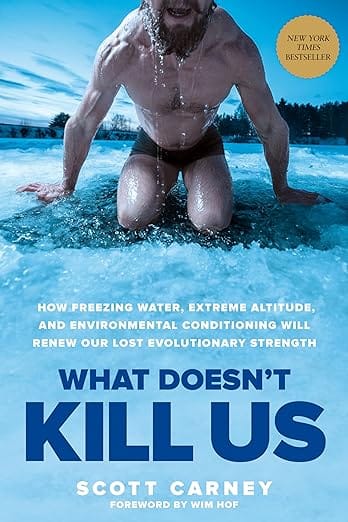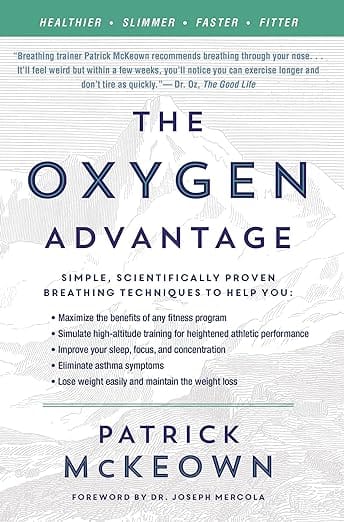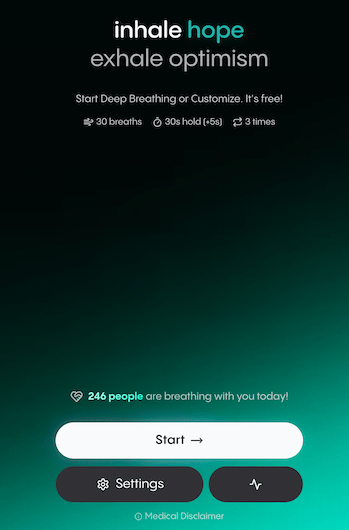I love breathing. Without breathing, I wouldn't be here today.
Seriously, though: Breathing in certain ways is a simple and powerful way to shift your state of mind. It's free, it's always with us (no gear required!), and many ways of breathing are quite discreet — you could even do them next to other people without them realizing you're doing anything special.
When I say "shift your state" I mean moving from a "fight or flight" (sympathetic) mindset/feeling to a calmer "rest and digest" (parasympathetic) one, or vice versa — getting yourself more energized and focused when you're feeling a bit drowsy.
I've been playing around with breathing for a few years now. Some people call it "breathwork" but that's a term I don't love — why does everything have to be about work? Also, there's something about the term "breathwork" which makes it sound a little woo-woo maybe — but breathing changes your state in ways that are firmly rooted in physiology and how the body works and are quite well understood by science.
Over these few years I've read a bunch of books on the topic and tried all sorts of apps and routines. A few stood the test of time, and those are the ones I want to share below. I keep coming back to these.
Oh, and before we dive in: Don't get overwhelmed by this big list. Breathing techniques are generally easy to learn and quick to practice, and you can usually tell a difference in how you're feeling right away.
Breath

(James Nestor, 2020)
If you only read one book out of this post, read Breath. I read it after I read the next couple of books, but it offers a great intro into the field.
Breath is a broad overview of the field — it covers all sorts of breathing techniques and experts. You can use it as a map if you want to dive deeper, or just as a primer on its own.
This is readable, enjoyable, pop science. If you take away one thing from it — breathe through your nose, always. It explains why.
What Doesn't Kill Us

(Scott Carney, 2017)
Wim Hof is a Dutch man with a beard who takes deep breaths and can then hold his breath for a long time. He can also deal with cold exposure quite well.
His feats are interesting to read about, but the real value here is the technique itself. It's not something I practice daily, but every now and then it's a fantastic and powerful way to calm down. Out of all of the breathing techniques I know, the Wim Hof one is the most dramatic. Takes ten minutes, and not at all discreet, but it's great.
This is the best intro to the Wim Hof method I know. Wim Hof wrote his own book, which I've also read. Carney's is more readable and entertaining (to me, anyway) and still packs a lot of information.
There's also an old Vice documentary about Wim Hof and all sorts of articles online — but What Doesn't Kill Us is the perfect combination of comprehensive and readable.
Oxygen Advantage

(Patrick McKeown, 2016)
It's funny to me that McKeown and Hof wrote blurbs for each other's books. It's quite civil of them both, because really, their philosophies are pretty much diametrically opposed (other than that they both agree breathing is important).
Oxygen Advantage is about LSD — not the drug, but the acronym "Low, Slow, Deep". This describes a type of breathing that should result in tolerable "air hunger" and over time results in various physiological improvements.
The book includes a good mix of theory and practical techniques and exercises. It's low-key — certainly less flamboyant than Wim Hof. Like the style of the book, the techniques themselves are more discreet and quiet. These are things you can do with other people around you, or even while walking in nature, without drawing undue attention to yourself.
It makes quite a few claims, though — I am not sure about those, myself. The reason I'm including it here is that this is my favorite technique for going to sleep at night.
Huberman's Physiological Sigh
Draw a deep breath in through your nose, until you're full. Then, without letting your breath out first, breathe in again (so you're "extra-full"). Now let it all out through your mouth, with a sigh.
Repeat as needed. Often, one time is enough.
You don't have to do this fast; take your time.
This is from Andrew Huberman, and it's simple and effective. He calls it a "physiological sigh" and it's really calming.
You can find clips of him describing it online and demonstrating it. I think he's got some other breathing-related techniques, but to me this stood out as particularly effective, simple, and quick. I use it myself and have used it to help others calm down as well.
DeepBreathe.app

Wim Hof has an official app which feels like a money grab. Why do I have to pay for a subscription? This is just breathing.
DeepBreathe.app is a Wim Hof-style breathing timer with many options. It runs great on a mobile browser (better than on a desktop, in fact). I use my iPhone's "Guided Access" mode to keep the screen from turning off when I use it, and I think that also keeps notifications from interrupting me in the middle.
DeepBreathe is completely free, though you can donate if you wish (I did).
What did I miss?
Like I wrote at the top, this is a "highlight reel" of the best resources I've found over the years of doing this — but maybe there's an amazing tool or book I missed. If you know of one from your own experience, I'd love to hear about it — email me at [email protected].
And as always, thank you for reading!


